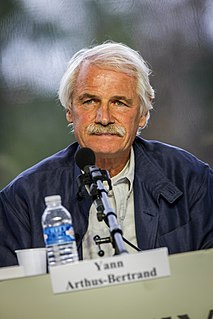A Quote by William McDonough
Consider this: all the ants on the planet, taken together, have a biomass greater than that of humans. Ants have been incredibly industrious for millions of years. Yet their productiveness nourishes plants, animals, and soil. Human industry has been in full swing for little over a century, yet it has brought about a decline in almost every ecosystem on the planet. Nature doesn't have a design problem. People do.
Related Quotes
There is nothing wrong with the planet. The planet is fine ... been here 4 1/2 billion years. We've been here, what, a 100,000 years, maybe 200,000. And we've only been engaged in heavy industry a little over 200 years. 200 years versus 4 1/2 billion. And we have the conceit to think that somehow we're a threat? The planet isn't going away. We are.
I think the 'Terminator' idea is a reasonable one - that is that one day the Internet becomes self-aware and simply says that humans are in the way. After all, if you meet an ant hill and you're making a 10-lane super highway, you just pave over the ants. It's not that you don't like the ants, it's not that you hate ants; they are just in the way.
While ants exist in just the right numbers for the rest of the living world, humans have become too numerous. If we were to vanish today, the land environment would return to the fertile balance that existed before the human population explosion. Only a dozen or so species, among which are the crab louse and a mite that lives in the oil glands of our foreheads, depend on us entirely. But if ants were to disappear, tens of thousands of other plants and animal species would perish also, simplifying and weakening land ecosystems almost everywhere.
We’re turning everything on the planet into food for humans so we’re cutting down the rainforests, displacing all of the animals, and we’re doing all this to feed humans... ... Imagine if there were only 2 billion people polluting? We’re already overpopulated. I feel we’ve become a parasite on this planet. If this population keeps growing, we’ll just keep devouring the planet, and I don’t think it’s going to stand for that very long.
In the Gaia theory air, water, and soil are major components of one central organism, planet Earth. What we typically think of as life - the plants and animals that inhabit the earth - has evolved merely to regulate the chemistry of the biosphere. Humans are insignificant participants, far less important to the life cycle than termites. Even the imbalance that we have created by adding massive quantities of carbon dioxide to the atmosphere may be brought back to acceptable levels by other organisms functioning in their capacity to correct excesses.






































